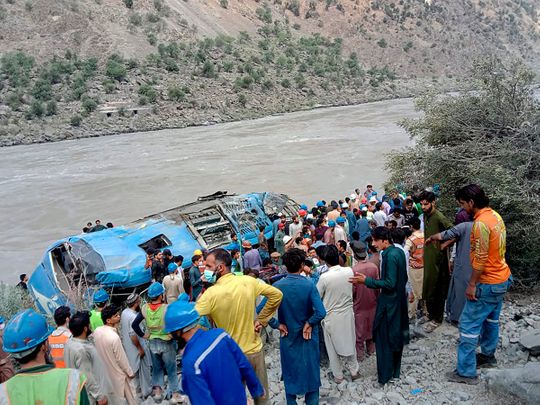
PESHAWAR, Pakistan: Nine Chinese workers were among 13 people killed on Wednesday when a blast on a bus sent it careering down a ravine in northwestern Pakistan, government and police officials said.
While Pakistani officials said the nature of the blast was under investigation, the Chinese embassy in Islamabad said its nationals had come under “attack”.
The bus was carrying Chinese engineers, surveyors and mechanical staff to the Dasu dam construction site in Khyber Pakhtunkhwa province, a local government official who did not want to be named told AFP.
“The blast sparked a fire in the engine plunging the vehicle into a ravine,” he said.

He said a further 28 Chinese nationals were injured.
A senior local police official, who also asked not to be named, confirmed the incident and said: “It was a heavy blast but its nature is not known yet”.
However, Pakistan’s Ministry of Foreign Affairs, in a press release received by Gulf News, said: “This morning a bus carrying Chinese workers in Khyber Pakhunkhwa Province, plunged into a ravine after a mechanical failure resulting in leakage of gas that caused a blast. Further investigations are underway.”
According to preliminary reports, nine Chinese nationals and three Pakistanis lost their lives. Chinese workers and accompanying Pakistani staff were proceeding to their work place for an ongoing project, it said. The local authorities are providing all possible assistance to the injured.
The Ministry of Foreign Affairs is closely in contact with the Chinese Embassy for coordination and facilitation, the release added.
The Chinese Embassy in a statement called the incident an "attack.''
"Recently, our workers at a business on a certain project in Pakistan were attacked and have suffered deaths and injuries,'' the statement said. "We have notified Chinese citizens in Pakistan to avoid venturing outside unless required by work or business and pay especial care to their safety.''
In Beijing, Foreign Ministry spokesperson Zhao Lijian said China was "shocked by and condemns the bomb attack in Pakistan's Khyber Pakhtunkhwa province.''
"We mourn over the Chinese and Pakistani personnel killed in the attack and express sympathies to bereaved families and the wounded,'' Zhao said at a daily news briefing.
"We have demanded the Pakistani side get to the bottom of the incident, arrest and strictly punish the assailants as soon as possible, and earnestly protect the safety of Chinese personnel, institutions and projects in Pakistan,'' Zhao said. In a statement on Wednesday, the Chinese embassy said that “a certain project of a Chinese firm in Pakistan suffered an attack, which caused the deaths of Chinese nationals”.
'Looks like sabotage'
Inspector General Moazzam Jah Ansari, the top police official of Khyber-Paktunkhwa, the province where the incident occurred, said two soldiers and two locals were also among the dead. Several people were injured.
"The bus plunged into a deep ravine after the blast and caused heavy losses. The rescue operation is launched and the entire government machinery has been mobilised to rescue the injured by air ambulance," a senior government official told Reuters on condition of anonymity. Ansari told Reuters that police were investigating.
"Looks like sabotage," Ansari said as he left on a helicopter for the site.
At least three other officials confirmed to Reuters that a blast hit the bus. A senior administrative officer of the Hazara region told Reuters the bus was carrying more than 30 Chinese engineers to the site of the Dasu dam in Upper Kohistan.
The Dasu hydroelectric project is part of the China-Pakistan Economic Corridor (CPEC), a $65 billion investment plan under Beijing's Belt and Road Initiative that is aimed at connecting western China to the Gwadar sea port in southern Pakistan.
Chinese engineers and Pakistani construction workers have been working on the Dasu hydroelectric project and several others for several years in the region where the blast took place.
In April, the Pakistani Taliban claimed responsibility for a deadly suicide blast at a luxury hotel hosting the Chinese ambassador, who was unhurt, in southwest Balochistan.
The group has recently claimed a string of attacks not only in Pakistan’s restive tribal areas along the Afghanistan border but also in the country’s cities, including the capital Islamabad.
There have been signs in recent months that the Pakistan Taliban have been regrouping along the Afghan border, claiming frequent clashes with security officials.
Beijing has poured billions of dollars into Pakistan in recent years to boost the country’s infrastructure.
But Chinese-funded projects have sparked resentment, particularly among separatist groups, who say locals see little benefit, with most jobs going to outsiders.
In 2019, gunmen stormed a luxury hotel in Balochistan overlooking a flagship Chinese-backed project - the deep-water seaport in Gwadar that gives China strategic access to the Arabian Sea - killing at least eight people.
And last June, Baloch insurgents targeted the Pakistan Stock Exchange in the commercial capital of Karachi, which is partly owned by Chinese companies.








